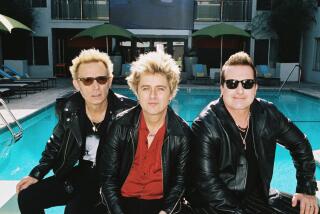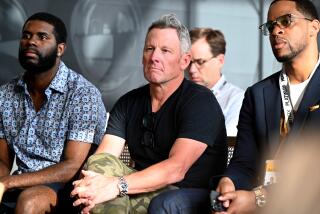Cycling World Is on Edge
- Share via
Lance Armstrong responded angrily Wednesday afternoon to the assertion by Tour de France Director Jean-Marie Leblanc that he believed Armstrong had used a blood doping drug during the 1999 Tour.
In response to a story Tuesday in France’s national sports newspaper L’Equipe that it had proof a urine sample taken from Armstrong seven years ago was found to contain erythropoietin (EPO), Leblanc told L’Equipe in a Wednesday story: “For the first time -- and these are no longer rumors or insinuations, these are proven scientific facts -- someone has shown me that in 1999 Armstrong had a banned substance called EPO in his body.”
Armstrong, 33, who won his seventh straight Tour de France July 24 after announcing his retirement, angrily defended himself Wednesday after a rally in Washington, held at the headquarters of Discovery Channel, the company that sponsors the only U.S.-based pro cycling team.
The rally had been originally scheduled so that employees could celebrate Armstrong’s record-setting triumph. Instead, according to observers, it became a rallying cry in support of Armstrong’s continued statements of his drug-free performances through his seven Tour wins.
“To say that I’ve fooled the fans is preposterous,” Armstrong said in a conference call. “I’ve been doing this a long time. We have not just one year of only B samples, we have seven years of A and B samples. They’ve all been negative.”
L’Equipe reported in its original story that it had matched the number on the tube of Armstrong’s B sample from 1999 to the number of each of the reports Armstrong signed before every drug test during the race. Normally no allegations would be made public unless both an A and a B sample had been tested positive but Armstrong’s A sample had been used for testing in 1999.
Those tests were all negative but a year later, during the 2000 Olympics, a new and more sensitive method for testing urine for EPO was unveiled. The test had been perfected at the same suburban Paris laboratory -- Chatenay-Malabry -- where this controversy has taken place.
Researchers at the lab were reportedly using the frozen samples of several cyclists for research purposes rather than in an attempt catch or sanction any competitors. L’Equipe said it acquired the records of the tests performed in 2004 and matched the numbers to indict Armstrong.
Jacques de Ceaurriz, head of the French lab, told a European radio station that 15 samples from 1999 had tested positive for EPO, though L’Equipe has so far named only Armstrong. De Ceaurriz said the lab couldn’t independently confirm that the supposedly anonymous sample did, in fact, belong to Armstrong.
Christiane Ayotte, director of the World Anti-Doping Agency’s Montreal lab, said she was “greatly surprised, five years after it was collected,” by the stability of the EPO allegedly found in Armstrong’s sample.
“I wonder if the retesting may have been conducted in 2000 or 2001, when the new test came out, and the results were being reviewed last year,” Ayotte said, adding that if the EPO was present in a 5-year-old frozen sample, “they were very lucky. We’ve never been that lucky here.”
But Arne Ljungqvist, chairman of the International Olympic Committee’s medical commission, said samples from 1999 still could produce legitimate EPO results years later.
“I believe they may well, if they have been properly stored -- without access to outside people so they cannot be tampered with. Also in a refrigerator or deep frozen,” Ljungqvist told Associated Press. “If not in such a situation -- there’s no guarantee they have not been subjected to undue temperatures.”
Ayotte also questioned whether the lab could claim an unbroken chain of possession of the sample. “All we at these labs have is trust,” Ayotte said. “When research is being conducted, these samples should be totally anonymous. This wasn’t the case. The sample was numbered. It will be difficult, now, to prove things.”
According to the drug testing rules of WADA and the international cycling federation UCI, before an athlete is accused of doping, a positive A and B sample need to be present.
Armstrong vehemently said that the samples he gave the Tour in 1999 were clean. “It doesn’t surprise me at all that they have samples,” Armstrong said. “Clearly they’ve tested all of my samples since then to the highest degree. But when I gave those samples, there was not EPO in those samples. I guarantee it.”
L’Equipe, which is owned by Amaury Sports Organisation, which also owns and runs the Tour de France, had regularly questioned Armstrong’s perpetually clean drug-testing record over the seven years the 33-year-old Texan and cancer survivor had dominated the race.
More to Read
Go beyond the scoreboard
Get the latest on L.A.'s teams in the daily Sports Report newsletter.
You may occasionally receive promotional content from the Los Angeles Times.










